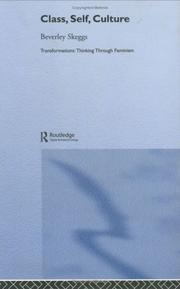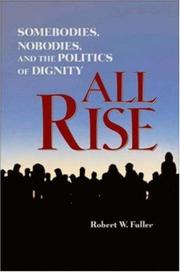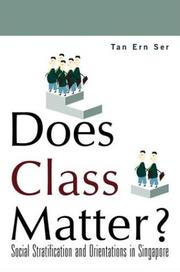| Listing 1 - 10 of 200 | << page >> |
Sort by
|
Book
ISBN: 1136242201 1315006995 1136242139 9781136242137 Year: 2013 Publisher: Oxon Routledge
Abstract | Keywords | Export | Availability | Bookmark
 Loading...
Loading...Choose an application
- Reference Manager
- EndNote
- RefWorks (Direct export to RefWorks)
First published in 1998
Social classes. --- Class distinction --- Classes, Social --- Rank --- Caste --- Estates (Social orders) --- Social status --- Class consciousness --- Classism --- Social stratification

ISBN: 0415300851 041530086X 1315016176 1136499210 1136499288 9781136499210 9781315016177 9780415300858 9780415300865 Year: 2004 Publisher: London : Routledge,
Abstract | Keywords | Export | Availability | Bookmark
 Loading...
Loading...Choose an application
- Reference Manager
- EndNote
- RefWorks (Direct export to RefWorks)
Class, Self, Culture puts class back on the map in a novel way by taking a new look at how class is made and given value through culture. It shows how different classes become attributed with value, enabling culture to be deployed as a resource and as a form of property, which has both use-value to the person and exchange-value in systems of symbolic and economic exchange. The book shows how class has not disappeared, but is known and spoken in a myriad of different ways, always working through other categorisations of nation, race, gender and sexuality and across different sites: through popular culture, political rhetoric and academic theory. In particular attention is given to how new forms of personhood are being generated through mechanisms of giving value to culture, and how what we come to know and assume to be a 'self' is always a classed formation. Analysing four processes: of inscription, institutionalisation, perspective-taking and exchange relationships, it challenges recent debates on reflexivity, risk, rational-action theory, individualisation and mobility, by showing how these are all reliant on fixing some people in place so that others can move.
Social classes --- Classes sociales --- Social classes. --- Value. --- Social stratification --- Sociology of culture --- Class distinction --- Classes, Social --- Rank --- Caste --- Estates (Social orders) --- Social status --- Class consciousness --- Classism
Book
ISBN: 9289342676 9289342692 9289342684 9789289342698 9789289342674 9789289342681 Year: 2015 Publisher: Copenhagen, [Denmark] : Nordic Council of Ministers,
Abstract | Keywords | Export | Availability | Bookmark
 Loading...
Loading...Choose an application
- Reference Manager
- EndNote
- RefWorks (Direct export to RefWorks)
Social classes --- Scandinavia --- Social conditions. --- Class distinction --- Classes, Social --- Rank --- Caste --- Estates (Social orders) --- Social status --- Class consciousness --- Classism --- Social stratification
Book
ISBN: 9781443818186 1443818186 9781443816755 1443816752 1282585258 9786612585258 9781282585256 6612585250 Year: 2010 Publisher: Newcastle Cambridge Scholars
Abstract | Keywords | Export | Availability | Bookmark
 Loading...
Loading...Choose an application
- Reference Manager
- EndNote
- RefWorks (Direct export to RefWorks)
Each of the book's contributors is engaged in critical academic research across a broad spectrum in Scotland. Although they are specialists in their chosen fields, they share a concern to problematise the post-devolution, 'new' Scotland by discussing it fully and effectively in the neo-liberal context of the 21st century. In addition, all of the authors are activists in the anti-capitalist, environmental, socialist and anti-war movements and are therefore engaged in the processes outlined in ...
Neoliberalism --- Social classes --- Neo-liberalism --- Liberalism --- Class distinction --- Classes, Social --- Rank --- Caste --- Estates (Social orders) --- Social status --- Class consciousness --- Classism --- Social stratification --- Social aspects
Book
ISBN: 0674043464 9780674043466 9780674032491 0674032497 0674267273 Year: 2009 Publisher: Cambridge, MA
Abstract | Keywords | Export | Availability | Bookmark
 Loading...
Loading...Choose an application
- Reference Manager
- EndNote
- RefWorks (Direct export to RefWorks)
Until now, the critical shift in Southern political allegiance from Democratic to Republican has been explained, by scholars and journalists, as a white backlash to the civil rights revolution. In this myth-shattering book, Byron Shafer and Richard Johnston refute that view, one stretching all the way back to V. O. Key in his classic book Southern Politics. The true story is instead one of dramatic class reversal, beginning in the 1950's and pulling everything else in its wake.
Political parties --- Social classes --- Class distinction --- Classes, Social --- Rank --- Caste --- Estates (Social orders) --- Social status --- Class consciousness --- Classism --- Social stratification --- Southern States --- Politics and government --- Race relations.

ISBN: 110711733X 1280420634 0511175779 0511016409 0511156375 0511329237 0511606125 0511048181 9780511016400 9780511175770 9780511606120 9786610420636 6610420637 052165212X 9780521652124 9780511156373 9780511048180 0521655676 9780521655675 9781280420634 9780511329234 Year: 1999 Publisher: Cambridge, U.K. New York Cambridge University Press
Abstract | Keywords | Export | Availability | Bookmark
 Loading...
Loading...Choose an application
- Reference Manager
- EndNote
- RefWorks (Direct export to RefWorks)
This accessible 1999 study of social class in contemporary Papua New Guinea deals with the new elite, its culture and its institutions, and its relationship to the broader society. The Papua New Guinea described here is not a place of exotic tribesmen, but a modernising society, shaped by global forces, and increasingly divided on class lines. The authors describes the life-style of the elite Wewak, a typical commercial centre, their golf clubs and Rotary gatherings, and bring home the ways in which differences of status are created, experienced and justified. In a country with a long tradition of egalitarianism, it has become at once possible and plausible for relatively affluent 'nationals' to present themselves in a wide range of contexts as fundamentally superior to 'bushy' people, to blame the poor for their misfortunes, and to turn their backs on their less successful relatives.
Social classes --- Class distinction --- Classes, Social --- Rank --- Caste --- Estates (Social orders) --- Social status --- Class consciousness --- Classism --- Social stratification --- Wewak (Papua New Guinea) --- Social conditions. --- Social Sciences --- Anthropology

ISBN: 1282299174 9786612299179 1605093009 9781605093000 9781609943127 1609943120 1576753859 9781576753859 Year: 2006 Publisher: San Francisco, CA Berrett-Koehler
Abstract | Keywords | Export | Availability | Bookmark
 Loading...
Loading...Choose an application
- Reference Manager
- EndNote
- RefWorks (Direct export to RefWorks)
In his groundbreaking book Somebodies and Nobodies, Robert Fuller identified a form of domination that everyone has experienced but few dare to protest: rankism, abuse of the power inherent in rank to exploit and humiliate someone of lower rank. It plays a role in just about every form of social oppressionÑracism, sexism, homophobia, and religious intolerance all have a significant element of rankism in them.Most everyone has felt the sting of rankism--at the hands of a dictatorial boss, a condescending teacher, an arrogant doctor, or an imperious bureaucrat. But, equally, most everyone has in
Social classes. --- Social values. --- Values --- Class distinction --- Classes, Social --- Rank --- Caste --- Estates (Social orders) --- Social status --- Class consciousness --- Classism --- Social stratification
Book
ISBN: 8779346707 9788779346703 9788779344464 8779344461 Year: 2009 Publisher: Santa Barbara Aarhus University Press
Abstract | Keywords | Export | Availability | Bookmark
 Loading...
Loading...Choose an application
- Reference Manager
- EndNote
- RefWorks (Direct export to RefWorks)
The financial crisis has shown how money can become an instrument for power and greed. The nature of money and financial institutions has again become issues of importance. This will also be the case in anthropology.John Liep's long awaited monograph on Rossel Island in Papua New Guinea analyzes an alternative monetary system. Liep studied the indigenous shell money for two years. The money is ranked in twenty classes. It is not a mean of market exchange but measure value in terms of status difference. It is paid in bridewealth, at pig feasts and for status symbols such as houses and canoes. O
Shell money --- Social classes --- Class distinction --- Classes, Social --- Rank --- Caste --- Estates (Social orders) --- Social status --- Class consciousness --- Classism --- Social stratification --- Money --- Papua New Guinea --- Social life and customs.

ISBN: 1281934690 9786611934699 9812794808 9789812794802 9781281934697 981238829X 6611934693 Year: 2004 Publisher: Singapore River Edge, N.J. World Scientific
Abstract | Keywords | Export | Availability | Bookmark
 Loading...
Loading...Choose an application
- Reference Manager
- EndNote
- RefWorks (Direct export to RefWorks)
This book provides a comprehensive portrait of class structure, dynamics, and orientations in Singapore - understood as a new nation, a capitalist and emerging knowledge economy, a largely middle-class society, and a polity with a strong state - at the turn of the new millennium. It introduces a wide array of recent data on a broad range of topics relating to social stratification in Singapore: class structure, political participation, political alienation, national pride, welfarism, success values, unionism, social mobility, the digital divide, and the sandwich generation. To capture the lived experiences of people from different social classes, thereby complementing the numerous tables presented, the book also profiles six case studies of individuals or families, highlighting the challenges they face and the options they possess.
Social classes --- Class distinction --- Classes, Social --- Rank --- Caste --- Estates (Social orders) --- Social status --- Class consciousness --- Classism --- Social stratification --- Singapore --- Social conditions.

ISBN: 1138134783 0415298903 1134425503 1280094702 0203412702 9780203412701 9781134425457 9781134425495 9781134425501 9781138134782 9780415298902 113442549X Year: 2002 Publisher: London : Routledge,
Abstract | Keywords | Export | Availability | Bookmark
 Loading...
Loading...Choose an application
- Reference Manager
- EndNote
- RefWorks (Direct export to RefWorks)
Bringing together subjects such as culture, religion, morals, politics, economics, and mentality, Perkin presents and applies a holistic concept of social history in the tradition of great historians of the past.
In this classic text of social history, Harold Perkin explores the emergence of a new form of class society in Victorian England, which differed radically from early modern society. He locates the origins of the modern English class system in the Industrial Revolution, the impact of which went beyond economy and technology, and changed the ways of living and perceptions of t
Social classes --- Class distinction --- Classes, Social --- Rank --- Caste --- Estates (Social orders) --- Social status --- Class consciousness --- Classism --- Social stratification --- History --- Great Britain --- Social conditions
| Listing 1 - 10 of 200 | << page >> |
Sort by
|

 Search
Search Feedback
Feedback About UniCat
About UniCat  Help
Help News
News